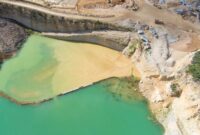Harnessing mountain water resources presents significant investment opportunities for stakeholders seeking sustainable solutions. The unique geography and climate of mountainous regions allow for the collection and utilization of water in ways that can not only enhance local economies but also contribute to environmental sustainability. This article explores various aspects of investing in mountain water resources, focusing on the benefits, challenges, and best practices for stakeholders.
Understanding Mountain Water Resources
Mountain water resources refer to the freshwater that flows from mountain ranges, typically originating from glaciers, snowmelt, and rainfall. These resources are crucial for several reasons:
- Sustainability: They provide a renewable source of water that can be managed sustainably.
- Ecosystem Services: Mountain waters support diverse ecosystems and are vital for biodiversity.
- Local Communities: They are essential for the livelihoods of communities living in or near mountainous regions, particularly in agriculture and tourism.
By understanding the dynamics of these resources, investors can identify opportunities that align with sustainable development goals.
Investment Opportunities in Mountain Water Resources
Investing in mountain water resources can take various forms. Here are a few key areas:
1. Water Infrastructure Development
Building and maintaining water infrastructure is crucial for maximizing the potential of mountain water resources. Investments can include:
- Dams and Reservoirs: These structures can help in storing water for irrigation, drinking, and hydroelectric power generation.
- Pipelines and Distribution Systems: Efficient water distribution systems ensure that water reaches the communities that need it most.
2. Eco-Tourism
Mountain water resources can be leveraged for eco-tourism. Tourists are often attracted to areas with beautiful lakes, rivers, and waterfalls. By investing in eco-friendly accommodations and activities, investors can create revenue streams while promoting conservation.
3. Agriculture and Aquaculture
Investments in sustainable agricultural practices that utilize mountain water can lead to increased productivity. Additionally, aquaculture projects can be developed in mountain lakes, providing fresh fish to local markets.
4. Renewable Energy
Harnessing the power of mountain rivers for hydroelectric energy generation is another viable investment. Small-scale hydropower plants can provide energy to local communities while reducing dependence on fossil fuels.
Challenges in Harnessing Mountain Water Resources
While there are numerous investment opportunities, challenges also exist:
1. Environmental Impact
Investors must consider the environmental impact of their projects. Unsustainable practices can lead to water pollution and biodiversity loss.
2. Legal Regulations
Navigating the legal landscape regarding water rights can be complex. Investors should be aware of local laws and regulations governing water use.
3. Climate Change
Climate change poses a significant risk to mountain water resources. Changes in precipitation patterns and melting glaciers can affect water availability, making it crucial for investors to incorporate climate resilience into their planning.
Best Practices for Investment
To ensure successful investments in mountain water resources, consider the following best practices:
1. Conduct Comprehensive Research
Before making any investments, conduct thorough research to understand the specific dynamics of the region’s water resources.
2. Engage Local Communities
Involving local communities in the planning and implementation of projects can enhance sustainability and ensure that investments benefit those who are most affected.
3. Monitor Environmental Impact
Regularly assess the environmental impact of projects to mitigate negative effects and ensure compliance with regulations.
4. Leverage Technology
Utilizing technology for water management can improve efficiency and sustainability. Smart irrigation systems, for example, can optimize water use in agriculture.
Conclusion
Harnessing mountain water resources offers valuable investment opportunities that can drive economic growth while promoting sustainability. By understanding the potential and challenges associated with these resources, stakeholders can make informed decisions that benefit both local communities and the environment. As the world faces increasing water scarcity, investing in sustainable water management practices becomes not only a profitable endeavor but also a necessary step toward a more sustainable future.
FAQ
What are mountain water resources?
Mountain water resources refer to freshwater sources originating from mountains, including rivers, lakes, and glaciers.
How can investors benefit from mountain water resources?
Investors can benefit through various avenues such as infrastructure development, eco-tourism, agriculture, and renewable energy projects.
What challenges do investors face in this sector?
Investors may face challenges related to environmental impacts, legal regulations, and the effects of climate change.
How can I ensure my investment is sustainable?
Conduct comprehensive research, engage local communities, monitor environmental impacts, and leverage technology to promote sustainable practices.




